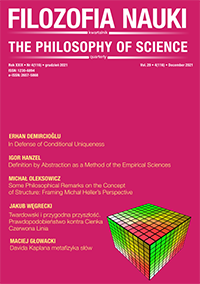Polish Logicians in the Years 1918-1948 on Social Functions of Logic
Polish Logicians in the Years 1918-1948 on Social Functions of Logic
Author(s): Jan WoleńskiSubject(s): Philosophy, History of Philosophy, Social Philosophy
Published by: Uniwersytet Warszawski - Wydział Filozofii i Socjologii, Instytut Filozofii
Keywords: education; rationality; science; philosophy; thinking
Summary/Abstract: The Polish School of Logic flourished in the period 1920-1939. Philosophically, it was influenced by Kazimierz Twardowski, professor at the University of Lwow (now Lviv in Ukraine), who established the Lwow-Warsaw School, to which the mentioned logical group belonged. Twardowski claimed that logic is very important in every kind of human activity, professional as well as private. Hence, every argument should be clearly formulated and proceed by correct inferential rules. These postulates involved semiotics, formal logic, and methodology of science — that is, logica sensu largo. This position was accepted by Twardowski’s most distinguished students, such as Jan Łukasiewicz, Stanisław Leśniewski, Kazimierz Ajdukiewicz, and Tadeusz Kotarbiński, who graduated before 1914, as well as the next generation of logicians and philosophers, particularly by Alfred Tarski. Although all these people considered logic, philosophy, and science as completely neutral with respect to politics and ideology, they treated logical skills as indispensable in political activities. In philosophical specialized terminology, Polish logicians regarded logic as a weapon against irrationalism. This position was also represented by Polish logicians who did not belong to the group of Twardowski’s students.
Journal: Filozofia Nauki
- Issue Year: 30/2022
- Issue No: 1 (117)
- Page Range: 67-81
- Page Count: 15
- Language: English

